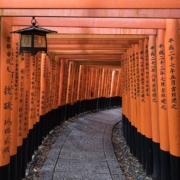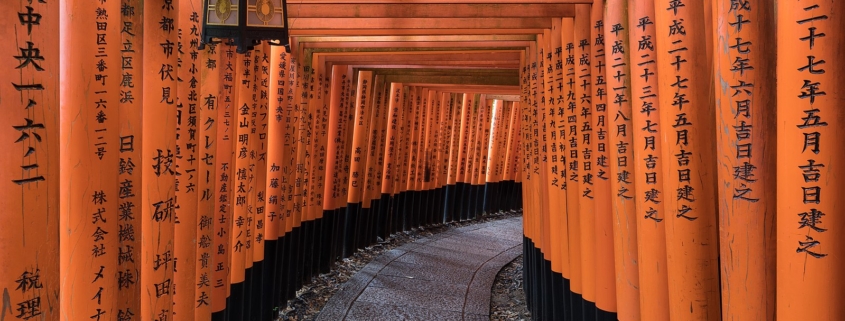There is no Magic Bullet

Torii path with lantern at Fushimi Inari Taisha Shrine. Photo by Basile Morin
Americans love a shortcut. I’m not sure how it became wedged in our culture so deeply, but there it is, and it plays out in so many different ways that end up hurting the collective.
It’s definitely a human trait to want to avoid the hard work and the arduous journey and find a way to leap right to a more comfortable place, but I think it’s important for us to assess the cost of these short-term fixes so we can determine whether or not they are actually helpful in the long run.
For months and months we’ve been pinning our hopes on a vaccine for Covid-19, hoping that it will release us from the new reality we’ve been living with masks and hand-washing and decreased opportunities to go to the movie theater and restaurants and have big celebrations with our beloveds. That isn’t necessarily a bad thing in and of itself, but in the absence of other things we could have been doing to mitigate the pain and suffering so many people have endured in the meantime, it speaks to our overriding desire for instant gratification. While other countries have managed to strongly limit the spread of disease by supporting their citizens with basic needs and universal health care, we have been over here railing against the virus and the leaders who dare to make difficult choices for us all (without actually supporting individuals and communities as they implement those measures). We are here clamoring for a series of shots that will keep us from having to actually build communities that can withstand catastrophe.
But it turns out there really is no substitute for actually giving a shit about each other.
Time and time again we look for systemic solutions, policy changes, and “leaders” who will create innovative new technologies to serve the masses, all while disregarding the basic, bedrock fact that our American culture isn’t built on caring for each other and uplifting community.
A vaccine won’t save us. To date, while the vaccines that have been approved have shown to prevent vaccinated individuals from developing an illness from the virus (if they have both shots), it is completely unknown whether they will keep the vaccinated individual from carrying the virus and transmitting it to others. Meaning that, because there is no way every single individual in your vicinity will receive the vaccine for a number of reasons, if we are to prevent spread of the disease, we will still have to practice the same social distancing and protective measures we have been living with for most of 2020. And people who can’t have the vaccine because of their health status will be at increased risk the more that others go back to “business as usual,” forcing them to even more severely curtail their social activities.
It will take years to know what the effect of these vaccines is on individuals and the collective, so what are we going to do in the meantime? Looking to other countries whose culture is more about belonging to each other, we can learn how to mitigate some of the devastating effects of this disease on community. Much of the upset about small businesses closing has to do with people losing their ability to pay rent and eat with any sort of regularity. We can fix that. There is enough money. We have enough money to test people often and accurately, we have enough money to ensure that health care workers have the proper equipment. We have enough money to ensure that landlords and tenants are taken care of and nobody loses their home. We have the resources to feed and house every single person in this country while we wait to learn more about how best to develop medications to fight Covid, what effect vaccines will have, and why some people don’t get sick from this virus while others are impacted heavily.
It’s a choice. The choice isn’t between whether or not to put kids back in physical school buildings. It’s not a choice between the economy or individual health. It is a choice between doing the hard work of making sure that every single person is as cared for on a basic level as they can be and pretending that there is some magic bullet out there and all we have to do is find it.
There is no magic bullet. There is only us. And, I’ll say it again, there is no substitute for actually giving a shit about each other.









Give a shit. Couldn’t have said it better myself. Everyone should. Few do.